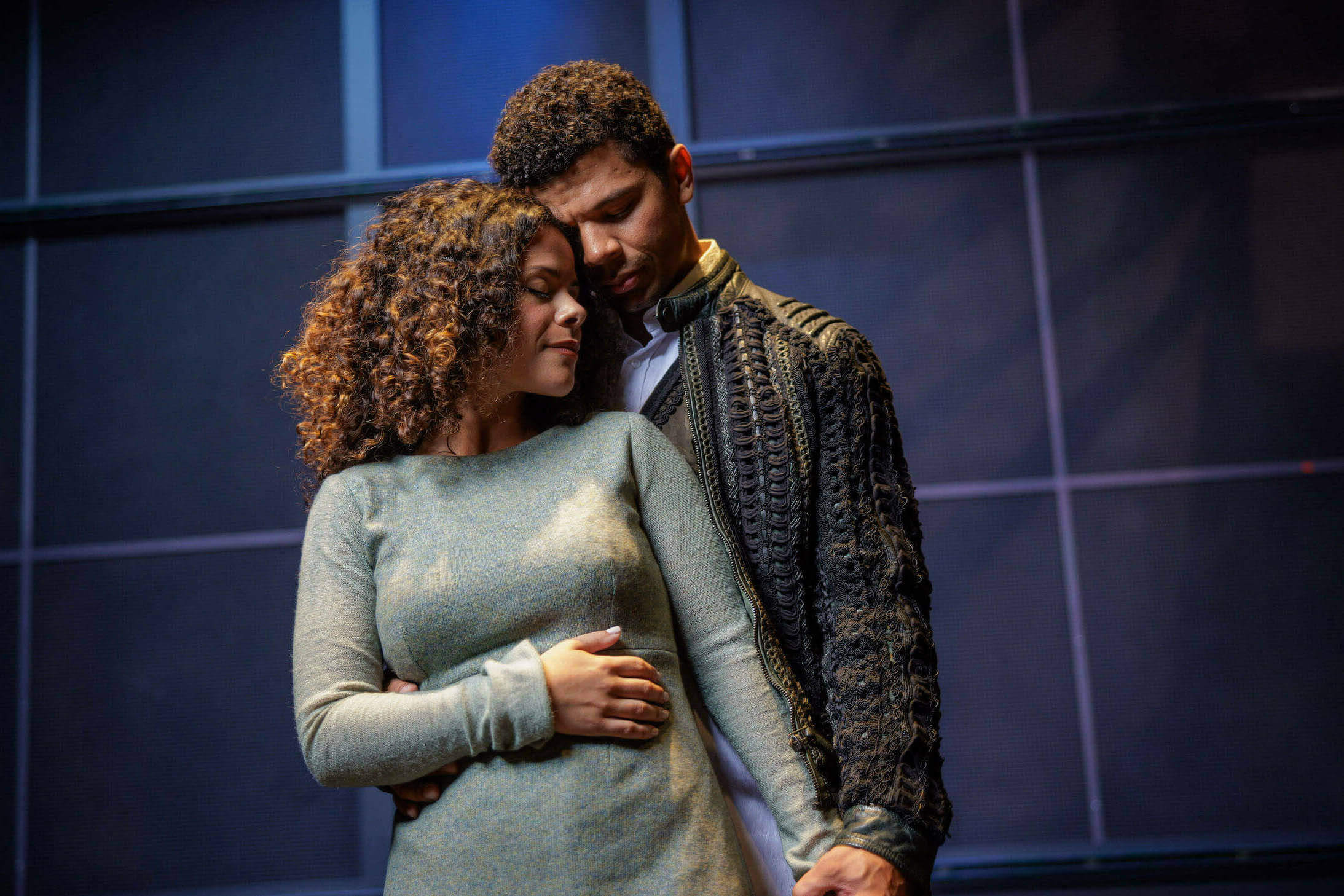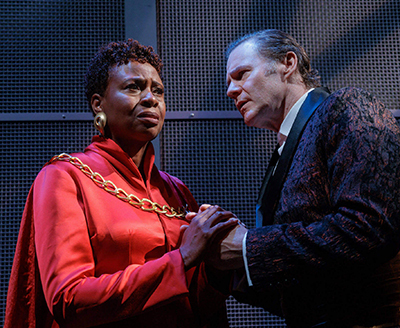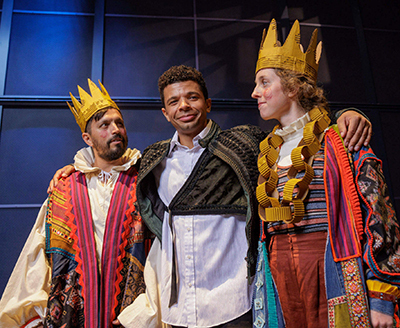Shakespeare at Notre Dame to present ‘Hamlet 50/50,’ a new gender-balanced adaptation of the play

“To be or not to be — that is the question.” It’s one of Shakespeare’s most famous lines and begins Hamlet’s most-anticipated soliloquy in Act 3 of the play.
But, Shakespeare at Notre Dame’s latest production is asking a new question: What if it’s not Hamlet who makes that speech?
This week, the Notre Dame Shakespeare Festival Professional Company will debut “Hamlet 50/50,” a world-premiere adaptation of the play focused on creating a more gender-balanced and equitable production model. “Hamlet 50/50” will be performed in the Patricia George Decio Theatre in the University’s DeBartolo Performing Arts Center from Aug. 17 to 27, with reduced-price preview performances on Tuesday (Aug. 15) and Wednesday (Aug. 16). Tickets are available online or in person at the box office.
The production — adapted by Vanessa Morosco and Peter Simon Hilton, founders of the 50/50 Shakespeare Project — will have dialogue evenly shared between male and female characters, in contrast to the original script of “Hamlet,” in which only 8.5 percent of the lines are spoken by female characters.
Morosco and Hilton, who have spent 30 years as practitioners of Shakespeare, said the inequity they’ve encountered in Shakespeare’s works made sense in his day because he didn’t live long enough to see a time where it was legal for women to perform on stage.
“He wrote exclusively for male practitioners,” said Morosco, who is also directing the production. “Most of his female characters were written for the young boys in his company. Today, that means that if we cast exclusively on gender-normative lines, women professionals are only permitted to play roles that are essentially written for what we would term an apprentice.
“That makes it a really challenging workplace in which to find equity and to have equitable access to creativity. We thought we should be better than that.”
Peter Holland, the McMeel Family Chair in Shakespeare Studies, who consulted on the adaptation of the script, acknowledges that some people may be concerned about changing such a classic work. However, he emphasized that the arc of the action is the same, and the great speeches are still there — even if they may be spoken by a different character.
“There are always people who think, ‘How dare you do these things to the Bard?’” Holland said. “But I say, if we don’t continue to remake Shakespeare, there’s no point in doing Shakespeare. The only Shakespeare I know I dislike is boring Shakespeare.
“Is this how the play should always be done? No. But is this an experiment worth trying? Absolutely. This says that if we’re really going to rethink what we mean by equity in the Shakespeare workplace, we can’t do it by just casting women in roles that are really men’s roles. We need to think it through and make sure it’s equitable for the cast, the crew, for everyone.”

To adapt the text, Morosco and Hilton went line by line, considering what events are happening, who is moving the plot forward and what changes might result from giving female-identifying characters additional lines — and, through that, additional agency.
That included the famed “To be or not to be” soliloquy, which will be performed by Ophelia.
“It’s a speech that has been lauded among those who love and produce Shakespeare, and it has the reputation of being a universal speech that applies to all humanity,” Morosco said. “So we thought, well then, couldn’t more people than Hamlet say it? And as we thought about the course of the play and which character is asking really hard questions, particularly about existence and mental health — it’s Ophelia. Being able to give voice to that is really exciting.”
In some ways, the speech itself becomes more powerful through that change, Hilton said. “It’s heartbreaking because when she says it, it’s quite different from the philosophical musings of Hamlet. It means so much more.”
Notre Dame is an ideal place to be premiering this new work, Holland said, and to engage with the issues it addresses in an academic setting.
“Being a part of a university means we can be experimental. We can use our scholarship. We can help people think about these things in a way that other theaters may not,” he said. “Notre Dame is a place where we should confront change and difficult material, and we do that all the time. It’s a place where we can advance these issues — and that’s what makes us better today.”

To that end, Holland and Scott Jackson, the Mary Irene Ryan Family Executive Director of Shakespeare at Notre Dame, hope to continue to engage with the audience — and Notre Dame students, in particular — about issues of equity and inclusion at a series of pre- and post-show discussions, as well as at other events throughout the upcoming academic year.
Two post-show talkbacks featuring Q&As with the cast and crew will take place on Aug. 18 and Aug. 25, and three pre-show “orientation” sessions with Holland and Morosco will be held on Aug. 19, Aug. 23 and Aug. 26.
Jackson said this production is also part of a larger vision at Shakespeare at Notre Dame to create an inclusive space where practitioners can work in partnership with Shakespeare and bring him into the 21st century.
“We believe representation matters on stage,” Jackson said. “And we’re very conscious of who is being given these opportunities and what that represents in terms of our core values. If we can work with a more diverse pool of actors that better represent our communities, we know they are going to tell the story from their own lived experiences, and that’s going to bring something vital and very contemporary to Shakespeare.
“For me, it’s all about helping the students and the audience to understand that Shakespeare is ours, and that it’s OK to take risks with his work. The element of risk is what creates great art and what will foster deeper ongoing conversations. And that’s the best thing we can do to keep Shakespeare relevant.”
Latest Colleges & Schools
- Prioritizing prenatal care may decrease low birth weight outcomes in The Gambia, Notre Dame research findsA new study co-authored by University of Notre Dame researchers highlights the importance of prenatal care for improving the health of mothers and newborns, providing evidence that can inform policy.
- Partial peace deals may facilitate comprehensive accords, offering roadmap for policymakers, practitionersPartial peace agreements — deals that address targeted issues on the way to larger comprehensive accords — could provide a blueprint for peacebuilding policymakers and practitioners, according to new University of Notre Dame research.
- Notre Dame Law School launches new Veterans Law ClinicNotre Dame Law School is launching a new Veterans Law Clinic, dedicated to providing free legal assistance to U.S. military veterans in matters such as disability claims and appeals.
- City of Gary and Notre Dame’s Housing and Community Regeneration Initiative announce vision and action plan for downtown GaryThe City of Gary and the University of Notre Dame School of Architecture’s Housing and Community Regeneration Initiative announced a “Vision and Action Plan” for downtown Gary during a news conference Tuesday (May 27). The final report serves as a roadmap for Gary’s leadership to follow to reestablish the city’s building culture.
- Notre Dame Executive MBA offers scholarships to area leadersMichiana Forty under 40 honorees can receive $30,000 toward tuition for the Notre Dame EMBA program.
- Kenneth Scheve appointed dean of the University of Notre Dame’s College of Arts and LettersKenneth Scheve, the Dean Acheson Professor of Political Science and Global Affairs and the dean of social science at Yale University, has been appointed the I.A. O’Shaughnessy Dean of the College of Arts and Letters by University of Notre Dame President Rev. Robert A. Dowd, C.S.C. Scheve, who will also hold a tenured faculty position in the Department of Political Science, begins a five-year term as dean on July 1.













